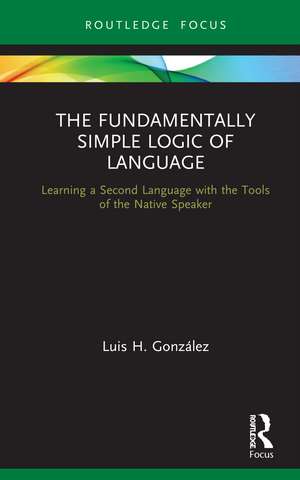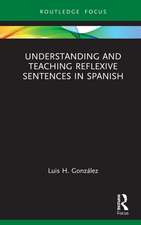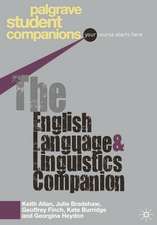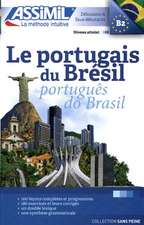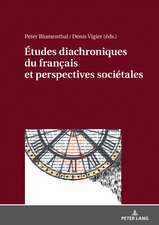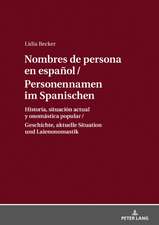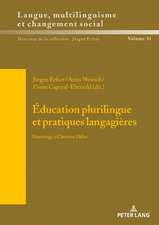The Fundamentally Simple Logic of Language: Learning a Second Language with the Tools of the Native Speaker: Verber, Verbed Grammar
Autor Luis H. Gonzálezen Limba Engleză Hardback – 8 feb 2021
Native speakers know who does what in a sentence by applying intuitively two simple inferences that are argued to be part of universal grammar. The book explains and exemplifies these two inferences throughout. These two inferences explain the native speaker’s ease of acquisition and use, and answer difficult questions for linguistics (transitivity, case, semantic roles) in such a way that undergraduate students and second language learners can understand these concepts and apply them to their own language acquisition. While Spanish is used as the primary example, the theory can be applied to many other languages.
This book will appeal to teachers and learners of any second language, as well as linguists interested in second language acquisition, in second language teaching, and in argument structure.
| Toate formatele și edițiile | Preț | Express |
|---|---|---|
| Paperback (1) | 137.55 lei 3-5 săpt. | +7.16 lei 7-11 zile |
| Taylor & Francis – 9 ian 2023 | 137.55 lei 3-5 săpt. | +7.16 lei 7-11 zile |
| Hardback (1) | 462.63 lei 6-8 săpt. | |
| Taylor & Francis – 8 feb 2021 | 462.63 lei 6-8 săpt. |
Preț: 462.63 lei
Nou
Puncte Express: 694
Preț estimativ în valută:
88.52€ • 92.43$ • 73.10£
88.52€ • 92.43$ • 73.10£
Carte tipărită la comandă
Livrare economică 15-29 aprilie
Preluare comenzi: 021 569.72.76
Specificații
ISBN-13: 9780367688295
ISBN-10: 0367688298
Pagini: 132
Ilustrații: 8 Tables, black and white
Dimensiuni: 138 x 216 x 13 mm
Greutate: 0.3 kg
Ediția:1
Editura: Taylor & Francis
Colecția Routledge
Seria Verber, Verbed Grammar
Locul publicării:Oxford, United Kingdom
ISBN-10: 0367688298
Pagini: 132
Ilustrații: 8 Tables, black and white
Dimensiuni: 138 x 216 x 13 mm
Greutate: 0.3 kg
Ediția:1
Editura: Taylor & Francis
Colecția Routledge
Seria Verber, Verbed Grammar
Locul publicării:Oxford, United Kingdom
Public țintă
Undergraduate AdvancedCuprins
1. How subject, direct object, and indirect object really work 2. Perfect auxiliary selection using verber and verbed 3. Solving the transitivity paradox 4. There are verberless sentences, but no subjectless ones 5. The case for the true gustar (piacere) verbs in Spanish 6. A brief comparison with some other theories of linking (argument realization)
Notă biografică
Luis H. González is Professor of Spanish and Linguistics at Wake Forest University. He completed his Ph.D. at the University of California, Davis. His main areas of research are semantic roles, case, reflexivization, clitic doubling, differential object marking, dichotomies in languages, Spanish linguistics, and second language learning. He is the co-author of one book and the author of three other books:
- Gramática para la composición. 2016. 3rd ed. Washington: Georgetown University Press. A Spanish advanced grammar and writing textbook, now in its third edition. Co-authored with M. Stanley Whitley.
- Cómo entender y cómo enseñar por y para. 2020. London: Routledge. https://www.routledge.com/9780367688295
- Four Dichotomies in Spanish: Adjective Position, Adjectival Clauses, Ser/Estar, and Preterite/Imperfect. 2021. London: Routledge. https://www.routledge.com/9780367517281
- The Fundamentally Simple Logic of Language: Learning a Second Language with the Tools of the Native Speaker. 2021. London: Routledge. https://www.routledge.com/9780367347819
Descriere
The Fundamentally Simple Logic of Language: Learning a Second Language with the Tools of the Native Speaker presents a data-driven approach to understanding how native speakers do not use subject and direct object to process language.
